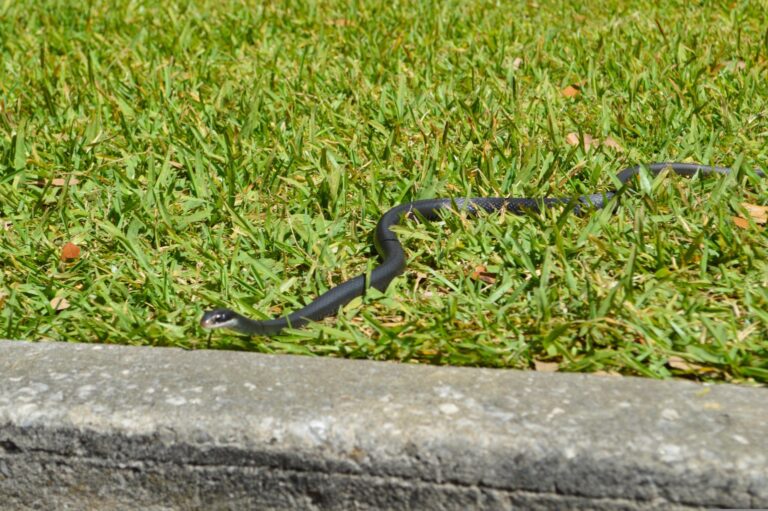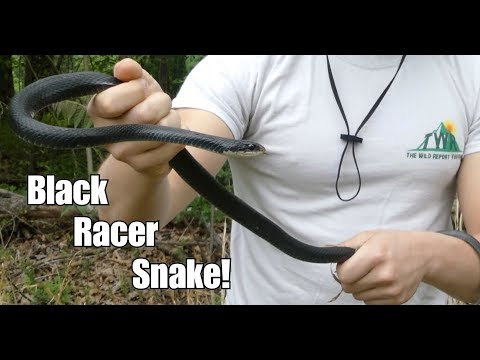For most of us, suddenly coming upon an unknown snake at close range out in the world is certainly enough to get our heart rate going just a little bit quicker.

But what is sure to get your heart beating double time is seeing a jet-black snake, tearing through the grass or out of the underbrush toward you or across your path.
Sound like a nightmare? It isn’t, because you’ve just heard about an entirely common encounter with the black racer.
Black racers, just like the name says, are famous or rather infamous for their speed and agility. Sometimes they come straight at people, though this is due more to poor eyesight, and less to malice.
It might be enough to give you a heart attack, but is the black racer venomous and is it dangerous?
No, the black racer is non-venomous and almost entirely harmless to people. They may eat small animals like newborn chicks and bird eggs, however.
Black racers are very common in the southern part of the United States, and for anyone who lives outside of a city, it’s almost unheard of to talk to someone who hasn’t seen one.
Not trying to make you nervous, but if that sounds like you then you should prepare yourself for an exciting encounter!
There’s no need to get too upset, I’ll tell you everything you need to know about these athletic but harmless snakes in the rest of this article…
What Does the Black Racer Snake Look Like?
Black racers are great examples of snakes where you learn almost everything you need to know about them from the name alone.
These snakes are very fast, and have an appropriately slender body type, with adults being anywhere from 3 ½ feet to 6 feet long or perhaps a little longer, with a narrow rounded head and small, beady eyes.
The body is always dark in color, and ranges from an iron blue-gray to a solid, glossy black sometimes interspersed with a faint pattern of even darker patches.
The ventral side, or belly, of the snake varies somewhat, and could have a matching color the same as the scales on the back or be a pale tan, off-white or even a very pale yellow color.
One thing that can help you identify a black racer with certainty is the throat and chin: even if the belly is of uniform color with the back, these parts will always be an ivory or off-white color.
Also, even compared to other snakes of similar size the black racer is famous for its speed and they are routinely seen on the move slithering and along at a good clip.
They are quite impressive, and we’ll get your attention if they are heading your way, I promise!
Where are Black Racer Snakes Found?
The black racer is found throughout much of the eastern half of the United States, and specifically all along the East Coast through Appalachia and into the Deep South.
These snakes are surprisingly adaptable and can be found dwelling near coastlines, in wood lines, or thin forests, along streams and rivers, near wetlands and mangroves, and even cruising around in overgrown fields or pastures.
Also, I don’t mean to alarm you, but make sure you look up: black racers are extremely capable climbers and it’s hardly uncommon to spot them slithering around in treetops or even hanging from tree branches taking in the scenery.
Black racers that are confronted at close range often flee up into a tree at speed if one is nearby.
And once again, these snakes are extremely common, so it’s probably only a matter of time until you bump into one…
Are Black Racer Snakes Venomous?
No, they aren’t. Black racers are non-venomous.
Can the Black Racer Snake Kill Pets or Domestic Animals?
Although they are no threat to larger animals, black racers compose a definite threat to any small mammals, chicks or ducklings and bird eggs.
Also, you need to be really careful if you’re breeding rabbits, rodents, and other similar critters.
Black racers are very proficient hunters, and though they usually subsist on a diet of mice, other small reptiles and some amphibians they will try to eat anything that they think they can overpower.
If you have chickens or ducks, this definitely means keeping a lookout lest they break into your coop and start raiding eggs or killing chicks.
This is much easier said than done, however, because these snakes are clever, great climbers and capable of squeezing through any opening where they can fit their head.
Much of the time, you’ll find a black racer sleeping it off in the chicken coop after eating eggs because they won’t be able to fit their body back through the hole they came in by!
However, smaller black racers need to be careful if they are going to poach chicken eggs because they might find themselves killed by irate roosters and hens.
It has happened before, and will happen again: many folks in areas where black racer populations are present have reported coming out to the run or coop only to find their chickens devouring what is left of the snake.
Talk about turning the tables!
Will Black Racer Snakes Attack Humans?
Generally no, preferring to use their speed to make an escape whenever they feel threatened, but if they are cornered, stepped on, or grab they will bite and do so quickly and repeatedly.
Also, one fun fact about black racers is that they, like other snakes, may imitate the warning buzz of a rattlesnake by rapidly drumming the tip of their tail on the ground or in dry grass.
They don’t have a rattle, of course, and again, they aren’t venomous but they do this in an attempt to scare off would-be predators.
Will a Black Racer Snake Bite Hurt You?
Yes, generally. Though strictly non-venomous, black racer snakes can still grow to be quite large, and pretty powerful.
Their mouths are full of several rows of small, hooked, sharp teeth that can easily inflict lacerations on bare skin.
Also, unlike some other snakes, black racers tend to go completely nuts when grabbed, thrashing like mad, pooping and biting repeatedly in an effort to free themselves from capture.
This means you might have multiple cuts and gashes to deal with if you try to wrangle one of these snakes in the wild.
Consider also that snake bites are highly likely to get infected unless cleaned out with expert care, and the small teeth of these snakes can break off inside the wound, further complicating matters.
If you’re bitten by a black racer, don’t play it off: get checked out by a doctor just to be sure, because an infection resulting from the bacteria present in the snake’s mouth might have life-threatening consequences!
Is it Best to Kill Black Racer Snakes When You Can?
No, if you can avoid it. Black racers are not at all dangerous to people, and they won’t hurt most animals unless you own chickens, ducks, other birds, rabbits, rodents and the like.
If a black racer is hanging around on your property it’s easy enough to just shoo it away.
Black racers are important predators in every environment they are found in, so you want to avoid killing them out of hand unless they’re genuinely troublemakers.
Remember that these snakes are non-venomous, and if you are able to positively identify one you should consider catching it and relocating it, or having someone else do it for you.
But if the presence of the black racer, non-venomous as it is, is creating a dangerous condition for you, horses, cattle, or other animals then you might consider killing it.
 Like what you read?
Like what you read?
Then you’re gonna love my free PDF, 20 common survival items, 20 uncommon survival uses for each. That’s 400 total uses for these dirt-cheap little items!
Just enter your primary e-mail below to get your link:
We will not spam you.



 Watch this video on YouTube
Watch this video on YouTube